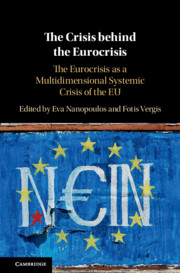Book contents
- The Crisis behind the Eurocrisis
- The Crisis behind the Eurocrisis
- Copyright page
- Dedication
- Contents
- Contributors
- Preface
- Acknowledgements
- Introduction The Elephant in the Room
- 1 There Is No (Legal) Alternative
- Part I The Crisis as a Crisis of the EU’s Identity
- Part II The Crisis as a Crisis of the EU’s Political and Democratic Legitimacy
- 5 Authoritarian Liberalism
- 6 The Inherently Undemocratic EU Democracy
- 7 Europe and Constituent Powers
- 8 ‘Who’s Afraid of the European Demos?’
- 9 Can Public and Voluntary Acts of Consent Confer Legitimacy on the EU?
- Part III The Crisis as a Crisis of the EU’s Economic Model
- Part IV The Crisis as a Crisis of the EU’s Social Character
- Part V Joining the Dots and the Way Forward
- Index
6 - The Inherently Undemocratic EU Democracy
Moving beyond the ‘Democratic Deficit’ Debate
from Part II - The Crisis as a Crisis of the EU’s Political and Democratic Legitimacy
Published online by Cambridge University Press: 07 July 2019
- The Crisis behind the Eurocrisis
- The Crisis behind the Eurocrisis
- Copyright page
- Dedication
- Contents
- Contributors
- Preface
- Acknowledgements
- Introduction The Elephant in the Room
- 1 There Is No (Legal) Alternative
- Part I The Crisis as a Crisis of the EU’s Identity
- Part II The Crisis as a Crisis of the EU’s Political and Democratic Legitimacy
- 5 Authoritarian Liberalism
- 6 The Inherently Undemocratic EU Democracy
- 7 Europe and Constituent Powers
- 8 ‘Who’s Afraid of the European Demos?’
- 9 Can Public and Voluntary Acts of Consent Confer Legitimacy on the EU?
- Part III The Crisis as a Crisis of the EU’s Economic Model
- Part IV The Crisis as a Crisis of the EU’s Social Character
- Part V Joining the Dots and the Way Forward
- Index
Summary
Almost ten years since the eruption of the global and financial crisis of 2008 and its European manifestation as the ‘Eurocrisis’, there is growing consensus that the latter quickly escalated or mutated into (among other things) a more profound democratic crisis. A number of prominent public intellectuals put pen to paper to warn not only of a crisis of European democracy, but of a crisis of the very ‘political institution’ of democracy, and particularly its representative and liberal variants. Contemporary manifestations of the ‘hollowing out’ of democracy following the Eurocrisis have taken many forms and several contributions in this volume have dealt with various aspects of the phenomenon.
The focus of the present chapter is on one aspect of this crisis, namely the Eurocrisis as a crisis of the EU’s own democratic credentials. Even as they insisted on its purely economic character, commentators were quick to criticise the undemocratic form that the emergency EMU-related responses to the Eurocrisis came to assume, particularly at the European level, where not only parliamentary processes, but also the Treaties’ legal prescriptions, were systematically circumvented.
- Type
- Chapter
- Information
- The Crisis behind the EurocrisisThe Eurocrisis as a Multidimensional Systemic Crisis of the EU, pp. 122 - 155Publisher: Cambridge University PressPrint publication year: 2019
- 1
- Cited by



